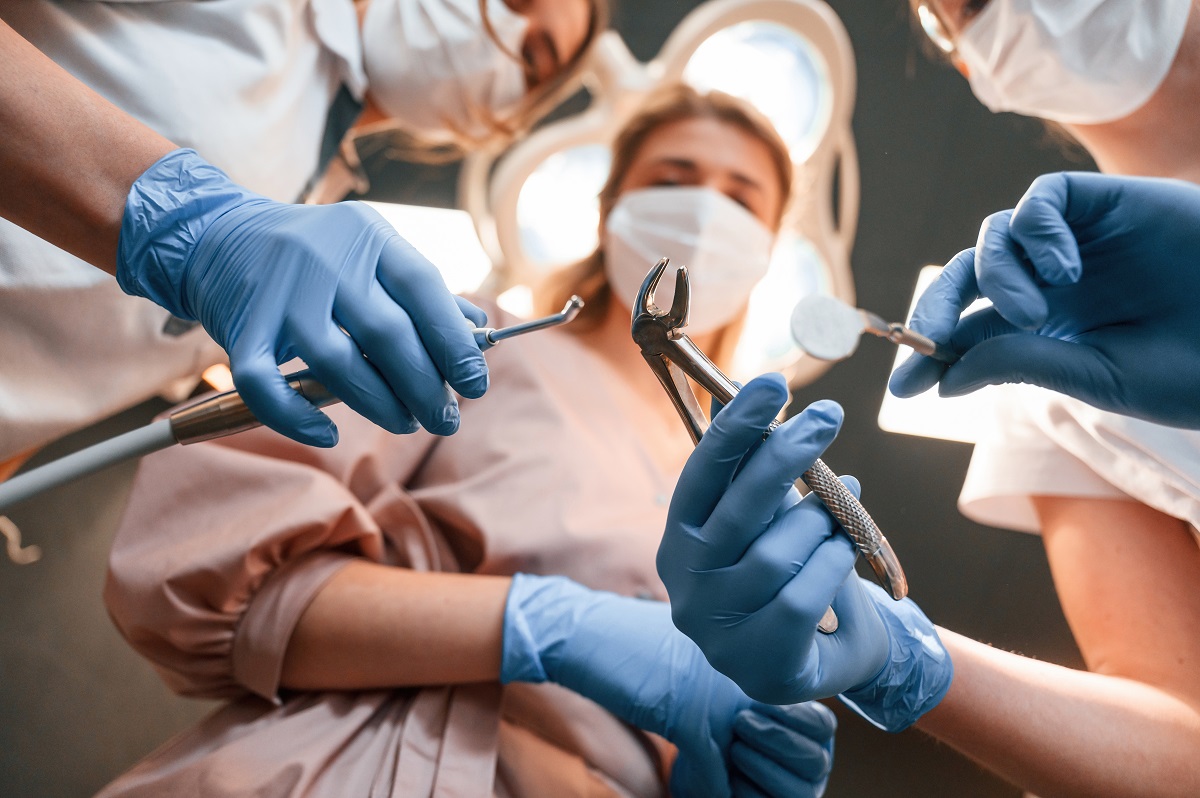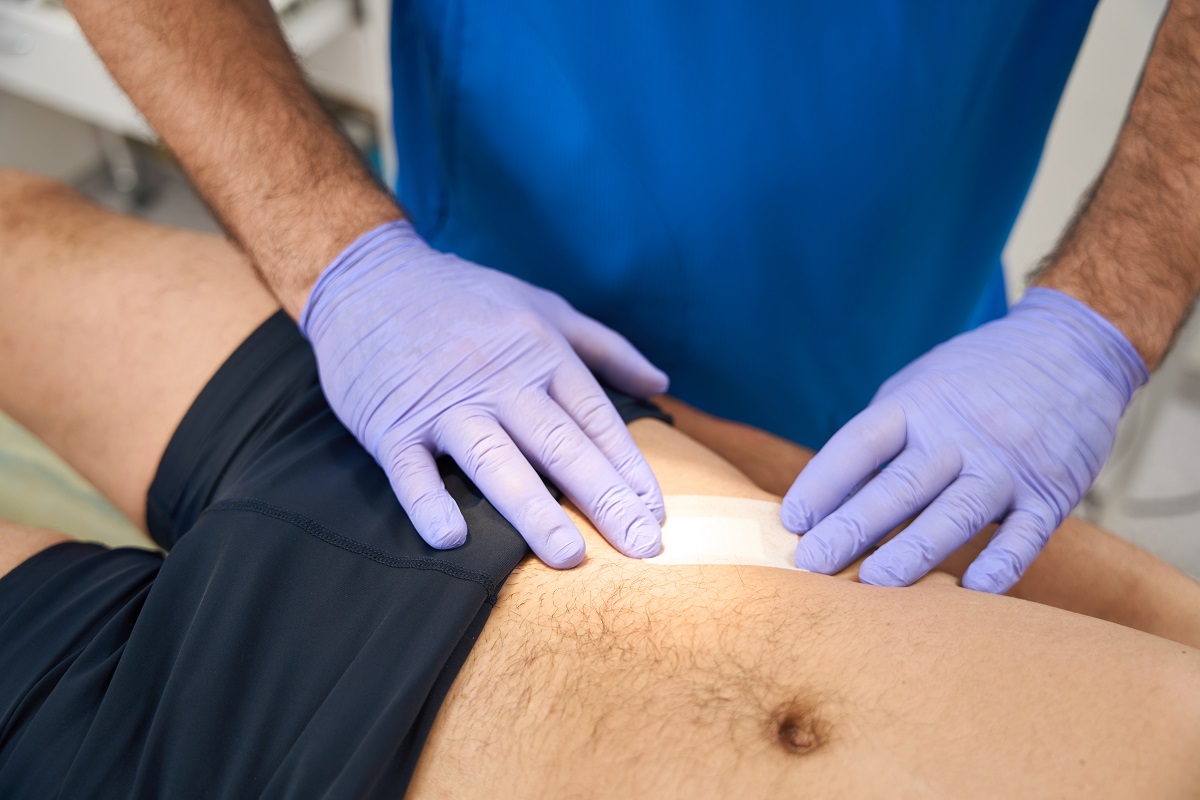When tissue (such as a part of the bowel) protrudes through weak abdominal muscles, an inguinal hernia happens. As a result, people experience a painful bulge, especially when they bend over, lift something heavy, or cough. However, not every time hernias cause pain.
This condition usually happens when a part of the membrane lining of the abdominal cavity (omentum) or bowel protrudes into a weak spot of the abdomen (in most cases near the inguinal canal) that carries the spermatic cord in males.
While inguinal hernias are not always dangerous, they can cause serious complications without treatment. Healthcare professionals often recommend surgery to repair an inguinal hernia that is enlarging and painful.
Symptoms
The inguinal hernia symptoms include:
- Discomfort and pain in the groin (especially when a person coughs, lifting something, or bending over)
- Pressure or weakness in the groin
- A dragging or heavy sensation in the groin
- An aching or burning at the bulge
- Swelling and pain near testes (sometimes)
Symptoms in Children
This condition can appear in children due to a weakness in the abdominal wall present at birth. However, this hernia can be noticed only when the baby is crying, coughing, or straining during a bowel movement. When children experience an inguinal hernia, lack of appetite and irritability can occur.
Additionally, if you cannot push the hernia back, its content may be trapped in the abdominal wall. Thus, an incarcerated (trapped) hernia may become strangulated restricting blood flow to the trapped tissue. Without treatment, a strangulated hernia can be fatal. Check below some symptoms of strangulated hernia:
- Nausea
- Vomiting
- Fever
- Sudden severe pain
- Hernia bulge color changes
- Inability to pass gas or move the bowels
If you notice that your hernia changes color into red, purple, or dark, immediately contact your healthcare provider.
Causes
These hernias usually happen without any apparent causes. However, some hernias may appear due to the following causes. Examples include:
- Pregnancy
- Chronic sneezing or coughing
- Strenuous activity
- Straining during urination or bowel movements
- Elevated pressure within the abdomen
- Preexisting weak spots in the abdominal wall
There are many people who develop this hernia type due to abdominal wall weakness present at birth or later in life caused by muscle deterioration or weakness caused by aging. Moreover, strenuous physical activity or coughing also can cause inguinal hernia.
A weakness of the abdominal muscles also can happen after surgery or injury. Furthermore, in males, this condition occurs in the inguinal canal that contains the spermatic cord which enters the scrotum. In females, an inguinal canal contains a ligament that helps hold the uterus. Hence, these hernia types occur where tissues that surround the pubic bone connect with uterus tissues.
Risk Factors
The following factors could elevate your risk of developing an inguinal hernia. Examples include:
- Age and sex – Males and older people are more prone to develop this hernia type. Weakness of the muscles can occur in older people making them more prone to get an inguinal hernia.
- Being white
- Family history – If you have a family history of inguinal hernias, you are more likely to have one.
- Chronic cough such as that caused by smoking
- Chronic constipation – Straining during bowel movements can occur due to constipation.
- Pregnancy – Weakness of the abdominal muscles can happen in pregnancy leading to increased pressure inside the abdomen.
- Premature birth or low birth weight – Commonly, babies born prematurely or low in weight are more likely to develop an inguinal hernia.
Complications
The following complications can occur in people with an inguinal hernia, especially if they do not receive treatment. For example:
- Incarcerated hernia – In such cases, the contents of the hernia become trapped in the abdominal wall, which leads to restricting the blood flow to surrounding tissues. Without treatment incarcerated hernia can be fatal. People who experience this complication may experience the following symptoms including severe pain, nausea, vomiting, and inability to pass gas or move the bowels.
- Strangulation – Death of the affected tissue can occur because an incarcerated hernia stops blood flow to the nearby tissues. This is considered a medical emergency which requires immediate surgery.
- Increased pressure on surrounding tissues – In most cases, inguinal hernias tend to enlarge and put extra pressure on nearby tissues such as the scrotum.
Is it Possible to Prevent an Inguinal Hernia?
The following tips can help you prevent this hernia type by reducing strain on the abdominal muscles and tissues. For example:
- If you are lifting something heavy, you should bend from the knees, not the waist.
- Quit smoking or never start because it can cause a chronic cough that worsens an existing or even causes an inguinal hernia.
- Adopt a high-fiber diet including fresh fruits, vegetables, and whole grains. These foods can prevent constipation and straining.
- Try to get and maintain a healthy weight for you. If you face problems with weight loss, discuss it with your healthcare provider.
Diagnosis
Healthcare professionals usually diagnose this condition by performing a physical examination to check for a bulge in the groin region and ask questions about symptoms and medical history. Sometimes, doctors may perform additional tests to confirm the condition. These include imaging tests (such as MRI, CT, abdominal ultrasound, and others).

Treatment
For people who have an inguinal hernia that is small and does not cause discomfort or pain, physicians may recommend watchful waiting or wearing a supportive truss that may lessen the symptoms. For children, doctors use manual pressure that may help to decrease the bulge size.
If hernia begins to enlarge and cause pain, doctors usually recommend surgery that helps to lessen the symptoms and prevent life-threatening complications. Check below two primary surgeries used to treat an inguinal hernia:
Open Hernia Repair
This procedure is usually performed with local or general anesthesia. Thereafter, surgeons will make an incision in the groin and will push the protruding tissue back into the abdomen. Surgeons will close the opening in the abdomen with stitches, staples, or surgical glue.
People are usually able to return to normal activities within a few weeks after open hernia repair.
Minimally Invasive Hernia Repair
This surgery can be done only along with general anesthesia. Surgeons perform the procedure through several small incisions in the abdomen. Sometimes, they may use robotic or laparoscopic tools to repair the hernia.
This is an effective choice for people with recurrent inguinal hernias and who experience hernias on both body sides. People who choose this treatment option may have less scarring and discomfort after surgery.
Frequently Asked Questions
What is the most effective treatment for people with an inguinal hernia?
In most cases, doctors recommend surgery to repair the hernia. It helps to lessen the symptoms and prevent dangerous complications.
What happens if a person with an inguinal hernia leaves it untreated?
If you do not get treatment for this condition, it may lead to life-threatening complications. For more details, consult with your doctor.
What foods should be avoided by people with inguinal hernias?
Healthcare professionals recommend avoiding foods that are acidic, oily, or that contain preservatives. These include fried, fatty, or oily foods. If you have additional questions, ask your healthcare professional.



